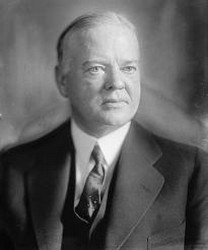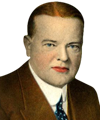Herbert Hoover Policies
|
| updated |
Copy Link Code
|
 Herbert Hoover's philosophy about life centered on helping others. He emphasized the basic importance of eliminating waste, showing compassion for children, volunteering, equal opportunity for all peoples and the importance of individual achievement. Most of his philosophies were based on his devout practice of Quakerism supported by his real life experiences in feeding the starving in Europe during and after World War I. Hoover, however, was not successful in applying these philosophies during his political career. Ironically, it would be his strident beliefs in individual self-reliance and volunteerism that cost him a second term as president.
Herbert Hoover's philosophy about life centered on helping others. He emphasized the basic importance of eliminating waste, showing compassion for children, volunteering, equal opportunity for all peoples and the importance of individual achievement. Most of his philosophies were based on his devout practice of Quakerism supported by his real life experiences in feeding the starving in Europe during and after World War I. Hoover, however, was not successful in applying these philosophies during his political career. Ironically, it would be his strident beliefs in individual self-reliance and volunteerism that cost him a second term as president.
Herbert Hoover's philosophy of individualism carried over into his presidency and thwarted his ability to see that government aid to citizens was necessary, because he had made his own way in life quite successfully. Before he was forty, Hoover was already a multi-millionaire as an engineer and mining executive; he felt that others had an equal opportunity and should be responsible for making their own way. Hoover once remarked: "Of the twelve men comprising the President, Vice-president and Cabinet, nine have earned their own way in life without economic inheritance, and eight of them started with manual labor." Unfortunately for Hoover, an extremely depressed economy doesn't give much opportunity to anyone.
Hoover's economic policies
Herbert Hoover's economic policies were not effective in attacking the effects of the Great Depression, although is less devastating times they might have had a fruitful impact. Some of his policies were:
- Expansion of the Federal Farm Board (FFB) to include making loans to farm cooperatives in order to create "stabilization corporations" that would keep agricultural prices up and provide a method of handling excess production.
- New and expanded public works projects which would help curtail unemployment.
- He encouraged businesses not to cut wages or lay off workers in order to maintain individual purchasing power, critical to a stable economy. The plan failed due to the reality that businesses could not continue to pay a constant wage while demand dropped to a level that required lower prices. Companies had to lay off workers which only created a higher unemployment rate.
- Hoover extended the scope of the federal government by increasing its involvement in agriculture, federal spending, international trade, immigration and wage and tax policy.
- A balanced federal budget. Instead of increasing taxes to increase revenue, Herbert Hoover felt that cutting taxes would encourage more spending.
Herbert Hoover's domestic policy
When Herbert Hoover became president in 1929, it was with an optimistic view toward prosperity for America. He bragged that "In no nation are the fruits of accomplishment more secure" and that "anyone not can be rich, but ought to be rich." Hoover warned of the dangers an activist government can bring at the same time he decried corporate greed. He believed that individualism was central to the success of America. But, Herbert Hoover was to be totally ineffective in instituting his beliefs as the nation plunged into the Great Depression.
Aside from the negative effects the Great Depression had on his presidency, however, Herbert Hoover was very successful in implementing some valuable domestic policies, some of which were:
- The reorganization of the Bureau of Indian Affairs to protect Native Americans from exploitation
- The institution of Federal prison reform which granted rights to prisoners and provided for extensive training of prison employees
- An increase in the amount of land set aside for national parks administered by the National Park System
- A vast increase in public works projects to combat poverty and unemployment during the depression
Herbert Hoover's political party
Although Herbert Hoover was a registered Republican, his progressive views aligned him with Democrats so fluidly that he was encouraged to run for president as a Democrat. Many of those influential in politics in the 1920s saw him as neither Democrat nor Republican based on his ideology, but Hoover considered himself a progressive Republican.
During his term as president, Congress was controlled by the Democratic Party who often supported Hoover's agenda until he began to refuse direct aid to those unemployed and poverty-stricken during the Great Depression.
Herbert Hoover's work in the Food Administration was probably his greatest political accomplishment because it was fueled by his humanitarian beliefs of helping those less fortunate. Without any government assistance or involvement, Hoover had raised millions of dollars in aid to provide food, medicine and supplies to Belgians trapped behind the lines after Germany invaded Belgium. Hoover also performed brilliantly as the U. S. Food Administration director who headed the efforts to cut conserve the resources and supplies needed during the war, while feeding the Allied troops.
